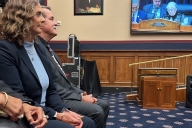You have /5 articles left.
Sign up for a free account or log in.
ARLINGTON, Va. --- What do you get when you mix a weekend night and plentiful booze with thirsty collegians seeking a diversion from midterms? Nothing good, at least at the unnamed private college portrayed in Paul Downs Colaizzo’s play, “Really Really.”
In what might be more of a typical Friday on campus than parents or college administrators would like to admit, Colaizzo explores several aspects of university life not mentioned in glossy viewbooks but seen too often in tragic news reports.
The play, which closed last month after a well-reviewed run at Signature Theater in this Washington suburb, harkens back to controversies at Duke University, the University of Virginia and elsewhere in which athletes were accused of sexual wrongdoing. No future productions have been announced.
Several Duke lacrosse players were accused and eventually cleared of sexually assaulting a stripper in 2006. Virginia lacrosse player Yeardley Love was murdered in 2010 by George Huguely, her ex-boyfriend and a fellow athlete.
Colaizzo, who wrote the first draft of the play in 2007 as a senior at New York University, said the Duke allegations helped inspire the production but not individual characters or events.
He wrote the play in hopes of highlighting the sense of entitlement he sees among some college students -- especially those at elite institutions -- and the often dangerous combination of a me-oriented youth culture and heavy drinking. He said his time at NYU provided the basis for some of his broader cultural points, but for “very little” of the plot.
"Every year and a half or so, a case very similar happens," he said. "It’s Yeardley Love this year. There's always something, and that’s sad."
But when something happens in “Really Really,” booze-clouded memories make the truth elusive.
After Leigh (Bethany Anne Lind) -- a bright student from a working-class family -- returns home from a party and accuses well-liked and well-to-do rugby player Davis (Jake Odmark) of rape, a sad truth emerges: everyone but Leigh seems too drunk to remember what happened. The play opens in the party's hazy aftermath and follows the cast's quest to figure out what occurred and who's at fault.
In spite of the damning accusations and campus judicial proceedings, the audience never learns whether the allegations are true.
“I have a very specific idea of what I believe happened,” Colaizzo said. “But if we answered that question, then the play would become about that. The play is not about that. The play is about these adults and the dangers of our actions and the dangers of our upbringing."
Despite the dark subject matter, Colaizzo manages to incorporate a fair amount of humor into the two-hour production that explores drinking culture, sexual violence, campus judicial policy, college athletics and blind ambition. One character has to jet off to the national Future Leaders of America convention, where she botches a pompous speech to a crowd of high-achieving peers.
He said the heavy drinking in the play -- the men's apartment was littered with red plastic cups and three beer cases the morning after the party -- was “par for the course” with his impression of many college campuses.
Though the production is a work of fiction, it's a timely one.
Yale University quarterback Patrick Witt had his Rhodes Scholarship candidacy ended last fall after he was accused of sexual assault by a female student, The New York Times reported. The woman chose an informal campus discipline hearing; Witt hasn’t been charged with a crime and denies wrongdoing.
Derrick Washington, a former University of Missouri at Columbia prospect, was convicted of sexually assaulting a former tutor in her apartment in 2010. Once an NFL prospect, he was sentenced to five years in prison.
Colaizzo said his decision to focus the story on a rugby player and his teammates was done to reflect the nature of many high-profile cases involving athletes. Too often, he said, a sense of entitlement leads to the implication of someone seemingly poised to be "the next great man."
“I’m sort of fascinated with the idea that college is a time for wealthy people to make mistakes,” he said. “But it is not a vacuum. It has implications in the real world. So the partying that’s rather acceptable in college and sort of the loose behavior and the finding of the moral balance that we all do in college, that has implications later in life.”






![First text message: "Yes?" Second message: "This is embarrassing to say, but law school isn't fair for us men, the women are always outperforming us at [sic]. It's obvious women are taking over the legal profession nowadays." Third text: "Who is this?"](/sites/default/files/styles/image_192_x_128/public/2024-09/Text_messages_law_2.jpg?itok=0QWP419B)

